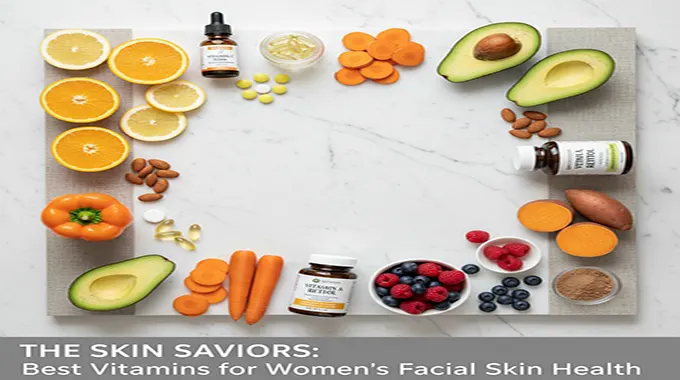Achieving radiant, healthy facial skin goes beyond topical creams and serums. The true foundation of a glowing complexion starts from within, fueled by essential nutrients. For women, in particular, certain vitamins play a crucial role in maintaining skin elasticity, fighting signs of aging, and protecting against environmental damage.
Here is a closer look at the key vitamins that are considered the best allies for women’s facial skin health, and how you can incorporate them into your routine.
1. Vitamin C: The Collagen Architect
Often called the “antioxidant hero,” Vitamin C (L-ascorbic acid) is perhaps the most celebrated nutrient for skin health. Its power comes from two main functions:
- Collagen Production: Vitamin C is an indispensable cofactor in the synthesis of collagen, the protein responsible for your skin’s firmness and elasticity. Adequate intake helps maintain a strong dermal structure, which can minimize the appearance of fine lines and wrinkles.
- Powerful Antioxidant: It neutralizes free radicals caused by UV exposure, pollution, and other environmental stressors. This protective action is key to preventing premature aging and sun damage.
- Brightening Effect: Vitamin C inhibits melanin production, which helps to reduce hyperpigmentation, fade dark spots, and even out skin tone for a brighter, more radiant complexion.
Find it in: Citrus fruits, strawberries, bell peppers, kiwi, and broccoli. It is also highly effective when used in topical serums.
2. Vitamin A: The Cell Regulator
Vitamin A and its derivatives, known as retinoids (like retinol and retinaldehyde), are the gold standard in anti-aging skincare.
- Cell Turnover: Vitamin A regulates skin cell growth and promotes cell turnover, replacing old, damaged cells with new ones. This process helps to smooth skin texture and clear clogged pores.
- Anti-Aging: Topically, retinoids are widely used to reduce the appearance of fine lines, wrinkles, and hyperpigmentation by stimulating collagen renewal in the deeper skin layers.
- Acne Control: It helps regulate sebum (oil) production, making it vital for managing acne-prone skin.
Find it in: Sweet potatoes, carrots, spinach (as beta-carotene, which the body converts to Vitamin A), liver, eggs, and fortified dairy.
3. Vitamin E: The Skin Protector and Moisturiser
A fat-soluble antioxidant, Vitamin E is a hydrating powerhouse that works synergistically with Vitamin C.
- UV Damage Shield: It absorbs the energy from UV light, acting as a crucial defense against sun damage and helping to prevent the formation of wrinkles and sagging.
- Barrier Support: Vitamin E helps strengthen the skin’s barrier function, enabling it to lock in moisture and soothe inflammation, making it particularly beneficial for those with dry or sensitive skin.
- Scar Healing: Its anti-inflammatory properties aid in the skin’s natural healing process and can help reduce the visibility of scars.
Find it in: Nuts (especially almonds), seeds (like sunflower seeds), vegetable oils, and avocados.
4. B Vitamins (Especially Biotin and Niacinamide)
While the entire B-complex is important, two B vitamins stand out for facial skin health:
- Niacin (Vitamin B3): Often found in topical form as Niacinamide, this vitamin is a powerhouse for barrier function. It helps reduce redness, minimize pore appearance, regulate oil, and improve overall skin elasticity.
- Biotin (Vitamin B7): Known as the “beauty vitamin,” Biotin plays a key role in the metabolism of fatty acids, which are essential for maintaining healthy, glowing skin, hair, and nails.
Find them in: Whole grains, eggs, nuts, seeds, lean meats, and green leafy vegetables.
5. Vitamin D: The Anti-Inflammatory Agent
The “sunshine vitamin” is essential not just for bone health, but also for the immune system and skin.
- Immune and Anti-inflammatory Role: Vitamin D plays a significant role in reducing inflammation and modulating the immune response in the skin, which can be helpful for conditions like psoriasis, eczema, and acne.
- Cell Repair: It supports cellular repair and rejuvenation.
Find it in: Moderate sun exposure, fatty fish (salmon, tuna), fortified dairy products, and supplements, as deficiency is common, especially in climates with limited sun.
A Holistic Approach to Facial Skin Health
While these vitamins are crucial, remember that they work best as part of a comprehensive strategy:
- Diet First: Prioritize a well-rounded diet rich in colorful fruits, vegetables, healthy fats (like Omega-3s from fish, flaxseeds, and walnuts), and lean proteins. Whole foods are the most bioavailable source of these nutrients.
- Topical Application: For targeted results, especially with Vitamins C and A (retinoids), topical skincare products are often highly effective.
- Consider Supplements: If you have dietary restrictions or a known deficiency, consulting a healthcare professional about supplements can help fill nutritional gaps.
- Protect Your Skin: No amount of vitamins can undo the damage from UV exposure. Daily use of a broad-spectrum sunscreen is the single most important step for long-term facial skin health.
By nourishing your body with these essential vitamins, you are giving your facial skin the building blocks it needs to remain firm, bright, protected, and beautifully radiant from the inside out.












